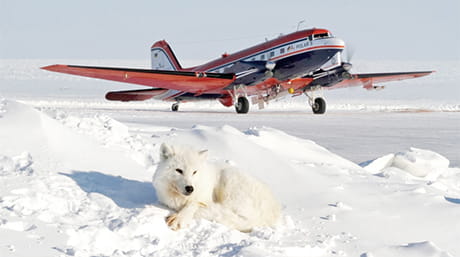Alfred Wegener Institute
From the North Pole to the South Pole, Alfred Wegener Institute ventures deep into the unknown – to places only a handful of us will ever set foot on.
The people at the Alfred Wegener Institute (AWI) - Helmholtz Centre for Polar and Marine Research combine science and exploration to unlock some of the mysteries of the world. From the North Pole to the South Pole, they venture deep into the unknown – to places only a handful of us will ever set foot on.
Unlike the adventures of Indiana Jones, however, the AWI isn’t looking for a golden chalice. They research the effects of climate change on particular ecosystems in the sea, on ice and on land. Their aim is to understand how the activities of humans and nature change the global environment.
Transporting equipment to the ends of the world
We started handling the logistical challenges of AWI about five years ago. And because of the extraordinary locations and the special equipment required, every transport is unique and challenging. Our work takes us to some of the harshest places in the world. And it is reassuring to have a logistics partner to help us get our equipment to the right place at the right time with any type of transport necessary.
Prof. Dr. Hugues Lantuit, Coastal Permafrost Geomorphologist, Alfred Wegener Institute – Helmholtz Centre for Polar and Marine Research
Adventures in science and transport
One important piece of equipment used by the AWI is the EM-Bird. The EM-Bird is a sensor that measures the thickness of sea ice. It is 3.6 metres long, weighs 100 kilograms and is worth half a million euro. This sensitive equipment has been shipped around the world and DSV was tasked with delivering it from Germany to Alaska.
When the equipment arrived in Alaska, the AWI team carried out measurements by either securing the EM-Bird to an airplane or hanging it from a helicopter on a long cable. When the measurements were completed, DSV returned the equipment to Germany where AWI extracted the data.
In another project, we moved special equipment for an AWI research team to Northern Canada. We had to make sure we got the equipment through treacherous conditions safely. Depending on weather conditions, we carried out the transport either by truck on ice roads or by charter flights when the snow melted. These types of projects are some of the most challenging, but also some of the most rewarding.

"To be able to work in these extreme climates with the AWI in their quest to combat climate change gives us great pride. We look forward to their next expedition and wish them all the best in their work," says Ralf Brunkhorst, DSV Air Freight Manager, Bremen, Germany.
About the Alfred Wegener Institute
The Alfred Wegener Institute carries out research in the Arctic and Antarctic as well as in the high- and mid-latitude oceans. It coordinates German polar research and makes important infrastructure available to international science such as the research icebreaker 'Polarstern' and research stations in the Arctic and Antarctic. The AWI is one of the 18 research centres that form the 'Helmholtz Gemeinschaft', Germany's largest scientific organisation.
Top photo: Johannes Käßbohrer, FIELAX
Bottom photo: Stefan Hendricks, Alfred Wegener Institute
Any questions?
Our experts are ready to help. Get in touch and we'll find the solution you need.


